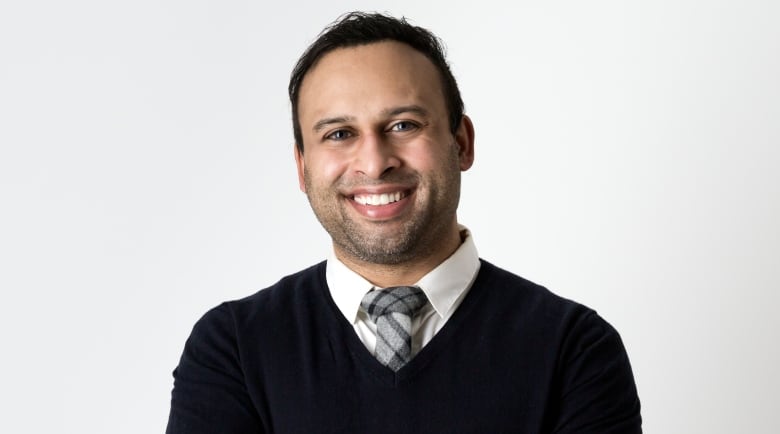Homeless population should be first for Phase 2 of vaccine, says Calgary doctor
Dr. Monty Ghosh says they have a high risk of transmission, hospitalization and death

As the provincial government sorts out who will be included in the next phase of the COVID-19 vaccine rollout, a doctor who works directly with those experiencing homelessness in Calgary is pushing for this population to be first on that list.
Dr. Monty Ghosh, co-chair of the Canadian Network for the Health and Housing of People Experiencing Homelessness, says research shows this group is more likely to transmit the virus, to end up in hospital and to die, when compared with the general population.
"After health-care providers, after long-term care facilities, we should target other congregate living spaces, so that would include shelters," he said.
Ghosh says his urging is based on a study published in the Canadian Medical Association Journal Open that found the homeless in Ontario were 20 times more likely to be hospitalized with COVID-19 than the general public.
As well, that they are roughly 10 times more likely to end up in intensive care and about five times more likely to die within 21 days of a COVID-19 diagnosis.
Other published research found the homeless are more than twice as likely to catch the virus compared with those who have homes, said Ghosh.

He says there's worry in the community that these rates may rise as cases of the new variants emerge.
"I think prioritizing them with the vaccine would help go a long way in protecting them," said Ghosh.
Negative backlash
Dr. Monty Ghosh says he realizes not everyone agrees with his opinion.
He says he got some angry emails after advocating for prioritizing the homeless population in a Canadian Press report earlier this month.
"The comments I saw were 'they're not taxpayers therefore they don't deserve the vaccine, they're not contributing to society, they're not contributing to our economy,'" he said.
"These are really negative comments."
He's also heard from critics that teachers or essential workers should be next.
"I agree, (essential workers) need support, too, and they are essential to our economy, they're essential to our survival. But their transmission rates aren't as high," said Ghosh.
Tough Decisions
A federal agency, the National Advisory Committee on Immunization, put out recommendations on how to prioritize the delivery of the COVID-19 vaccine across the country.
It says the order should be based on a population-based, risk-benefit analysis that considers the risk of exposure, transmission to others, severe illness and death and the safety and effectiveness of vaccines in key populations.
Those key populations include:
- Those at high risk of severe illness and death from COVID-19.
- Those most likely to transmit the virus to those at risk of illness and death and workers essential to maintaining the COVID-19 response.
- Those contributing to the maintenance of other essential services.
- Those whose living or working conditions put them at an elevated risk of infection, including Indigenous communities.
Infectious disease expert, Dr. Jim Kellner says no one wants to have to choose one group over another, but because of limited supply, tough decisions have to be made.

"It's one of those kinds of things where its ethically almost impossible to distinguish one highly deserving group from another highly deserving group.… So the idea is try to balance all these criteria and then take into account medical ethics perspectives," said Kellner, who sits on the COVID-19 Immunity Task Force, which tracks the spread of the virus in Canada.
But Kellner says we've already seen the priority list isn't set in stone.
Paramedics and health-care workers who work in COVID-19 units spoke up last month to advocate for their group to be moved up the list.
And it worked. The province included paramedics, emergency medical responders as well as doctors and nurses who work with COVID-19 patients into group 1A.
"When you put one group up against the other, it's impossible to come up with a perfect list of who should be prioritized. After long-term care facilities and the very front-line health-care workers, those are the only ones who are easy. After that, it's hard," said Kellner.
Phase 2 list in the coming weeks
Ghosh says he knows the province doesn't have an easy task deciding who gets the vaccine and when.
"Everyone wants the vaccine, everybody is lobbying to get the vaccine for their population of interest," said Ghosh.
But Ghosh and other advocates for those experiencing homelessness hope the province will continue to base it on risk and vulnerability.
The Canadian Alliance to End Homelessness issued a statement earlier this month calling on the federal, provincial and territorial governments to give priority to those experiencing homelessness.
It also urges people to write a letter to their health minister to advocate for this population.
"It's less about convincing people and more about making sure that governments, in particular, don't forget or know that this vulnerability is there," said Tim Richter, president of Canadian Alliance to End Homelessness.
"People who are experiencing homelessness are kind of out of sight, out of mind," added Richter.
CBC News asked the province for details about Phase 2 of the COVID-19 vaccine rollout. In response, it issued the following statement:
"We absolutely recognize that homeless Albertans and many others would benefit significantly from the vaccine. We want to offer them the chance to get immunized as soon as possible," read the statement.
"No decisions have been made outside of the groups listed in Phase 1. Decisions on groups who will receive the vaccine as part of Phase 2 will be finalized in the coming weeks."